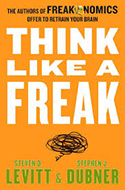What We're Reading Now
It’s Good to Be a Freak
12 August 2014
Allison Partners senior consultant (and first time blog contributor) Geof Hammond read Think Like A Freak. Inspired by the book’s engaging stories and anecdotes, he considered how an approach like experimentation could help him think like a freak. (In case you were wondering, that’s a good thing.)
Tags: creativity, design thinking, geof read, strategy
I struggled with Economics 101. For whatever reason, I could not grasp the idea of explaining “choice” and “resource allocation” through theories like “law of diminishing returns” or “substitution theory.” (My professor did deliver an especially engaging lesson using ten fast food tacos to illustrate the former, but it didn’t stick.) I did eventually learn to embrace the idea of economics during my consumer behavior courses in graduate school. It is this appreciation that continues to attract me to the various Freakonomics books by Steven Levitt and Stephen Dubner books.
Their most recent addition, Think Like A Freak, is the third in a series focused on what I can best describe as the novel application of economic theory to understanding human centered phenomena. Throughout the series, the pair illustrate complex economic models through engaging anecdotes. From a comparison of teachers and sumo wrestlers to demonstrate economic incentive to an analysis of real estate ads to explore the power of language, the books help shed some light on human behavior and motivations.

While the first two books were illuminating in their own right, Think Like A Freak is the first to propose a framework for—and practical approach to—thinking like a freak (their nomenclature for creative and strategic thinking).
One such practical tool is the book’s promotion of solving complex problems through experimentation and learning through feedback. Statistics, facts and figures may be helpful when solving problems; however, Levitt and Dubner assert that “in order to reliably measure cause and effect you need to get beneath the facts. You may have to purposefully go out and create feedback through an experiment.” This should sound similar to rapid prototyping and iteration for those familiar with design thinking and readers of this blog. (See July 2013’s posts A Practical Guide for Aspiring Design Thinkers and Design Thinking Really Is for Everyone.)
When faced with a complex challenge we often propose solutions based on equal parts “hunch” and “precedence.” We invest valuable resources implementing said solutions only to have them fail. What if we invested in learning, instead and devoted a portion of those resources to designing and running small field experiments?
Think Like A Freak, and design thinking, propose solving complex problems through such learning experiments, using simple prototypes to test potential solutions. Straightforward and simple experiments inform our hunches, challenge our assumptions, and inspire our solutions. When we experiment, we learn more about our problem and its stakeholders. Experimentation provides us with feedback necessary to refine our ideas into solutions.

My colleague Rachel will often encourage clients to experiment asking the question “How much do you think you could learn if you had one afternoon and a $50 budget?” Her point, like Levitt and Dubner’s, is that all data is valuable when solving complex problems. Even economists agree that even limited data that isn't statistically significant is far, far better than no data at all.
So, in the spirit of thinking like a freak, the next time you’re faced with a complex problem ask yourself, “What could I learn about my problem with an afternoon and 50 bucks?”







Comments
Our Comment Policy:
Our blog posts are only half of the conversation. What our readers have to say is equally important to us, and we're grateful for all the comments that continue the dialog.
To ensure that the discussion here is as useful as possible to all of our readers, please be respectful of our contributors and refrain from harassing, threatening and/or vulgar language. We reserve the right to screen and remove any comments from the site. If you have a question about a comment or want to discuss our policy, please contact us. We'll talk it over.
There are no comments for this entry yet.